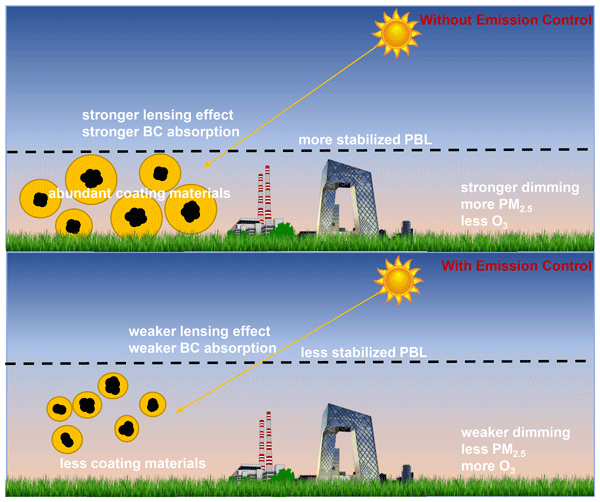Reduction of BC Aerosols and Incomplete Combustion Processes
Written by Aanya Deshpande
Black Carbon Aerosols
Chemical reactions (involving air pollutants), when undergone within the Earth’s atmosphere, create aerosols. Aerosols are microscopic particles so small that when released, remain suspended in the air (for days or weeks) instead of falling to the surface like larger particles. When these aerosols are released into the air, the sun’s energy can be reflected or absorbed as a result of them. The climate effects of some aerosols tend to vary depending on their appearances, or the method in which they were emitted. Aerosols that reflect sunlight cool the climate. The large amount of them that absorb sunlight (black carbon aerosols) have a warming effect. BC aerosols also may coat ice/snow. The melt is accelerated because the absorption of sunlight is increased. This is caused due to the BC darkening the surface of the snow. Reductions to aerosols in general, lead to environmental warming effects. If we target the reduction of black carbon emissions, we can reduce global warming.
Incomplete Combustion of Fuels
Black carbon aerosols (commonly known as soot) are the prominent form of particulate matter in the atmosphere that absorbs light. BCs are mainly discharged from incomplete combustion processes, which occurs when a reaction entails a fuel only partially burning due to lack of oxygen, or insufficient temperatures preventing completion. These cycles can be caused by both human and natural reasons. An ordinary example of an incomplete combustion process is burning fossil fuels (ex. coal). Recurrently, these fuels do not burn entirely, releasing waste byproducts (such as fossil fuels like carbon dioxide) into the current/neighboring air.
How Can We Prevent This?
Incomplete combustion can be prevented by preventing after burning. There are many other ways to reduce BC aerosols and incomplete combustion, therefore reducing the main contributors to climate change. This has the potential to be a rapid, although short-term, climate change approach.
References
https://www.sciencedirect.com/science/article/pii/S2590332223002397#:~:text=Since%20BC%2 0is%20an%20important,climate%20change%20in%20the%20Anthropocene.
https://www.sciencedirect.com/topics/engineering/complete-combustion#:~:text=In%20general% 2C%20the%20emissions%20of,most%20importantly%2C%20providing%20better%20mixing.
Written by Aanya Deshpande from MEDILOQUY


